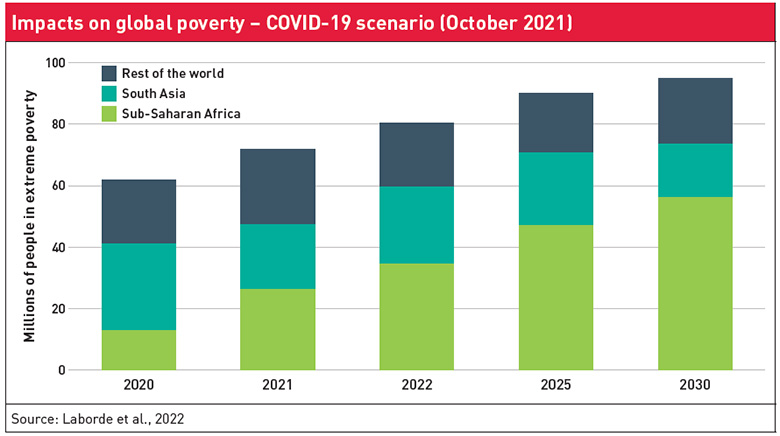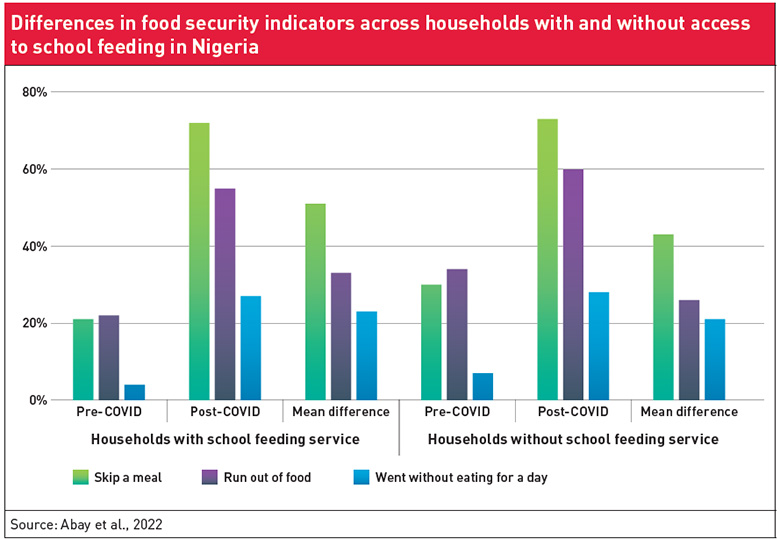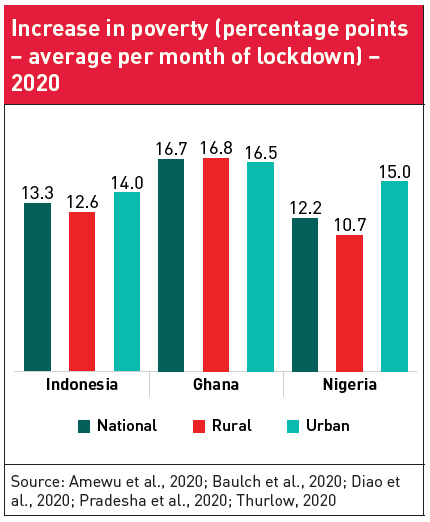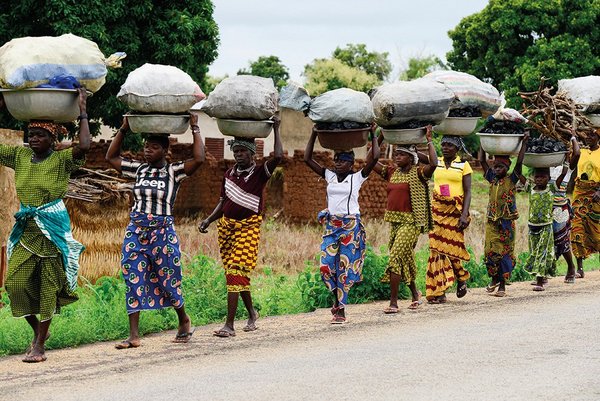Global food systems in the wake of Covid-19
The world has been struggling to contain Covid-19 for more than two-and-a-half years. Many initial policy responses to the pandemic, including widespread lockdowns and border closures, had severe impacts on food security through a massive recession and major disruptions of global food value chains. Poor and marginalised communities were disproportionately affected by these measures, through loss of livelihoods and assets, and for women, diminished empowerment and opportunities. Covid-19 exposed the vulnerability of agricultural and food systems to multiple shocks, including climate change and now, the conflict in Ukraine. From 2020 to 2022, researchers from the International Food Policy Research Institute (IFPRI) published key insights and analyses on how the pandemic affected and is still affecting poverty, food security and nutrition, food trade and supply chains, gender, and employment. Two books, COVID-19 & Global Food Security (2020) and COVID-19 & Global Food Security: Two Years Later (2022) present these insights, recommend policy interventions and offer reflections on lessons to better prepare for future crises. Some of the findings are presented in the following.
Immediate impacts: income losses, value chain disruptions, increase in malnutrition
The impact of Covid-19 on global food security was heterogeneous – disproportionately affecting the poor as compared to richer populations. What are the reasons for this disparity? Rising food prices and falling incomes meant that people had less real income to pay for food, forcing them to adjust accordingly. This effect is stronger when one has less income to begin with, spelling more hardship for those who are already impoverished. The immediate impacts of the pandemic on supply chains centred on disruptions concentrated in labour-intensive nodes of these chains. A lack of workers hampered harvesting, while limited inputs, like seed and fertiliser, caused difficulties in planting. Reduced transport facilities restricted transportation, and lockdowns and social distancing interfered with market exchanges. These value chain disruptions hurt both consumers and producers, as there were fewer urban supplies and less farm-level demand. This is also demonstrated in an analysis by Ceballos and colleagues from IFPRI of the short-term effects of Covid-19 in the Western Highlands of Guatemala, one of the country’s most vulnerable regions, which is already characterised by high poverty and stunting rates. The region experienced sharp decreases in incomes, a doubling of food insecurity and a decline in dietary diversity.
The income losses and disruptions to value chains affected dietary choices and have increased global malnutrition. When incomes decrease due to labour disruptions, lower-income households switch to cheaper and less nutritious foods at the expense of more nutrient-dense, albeit costlier foods. Low-income countries are the most vulnerable to the rise in international food prices, as food accounts for approximately half of consumption baskets and 20 per cent of imports. This shift in prices, and therefore consumer choices, ultimately limits dietary diversity and increases the risk of adverse health consequences. For example, Laborde and colleagues estimate that due to the pandemic, an additional 141 million individuals from low- and middle-income countries (LMICs) could not afford a healthy diet amid a slow global economic recovery. These disruptions could lead to an additional 9.3 million wasted children, 2.6 million stunted children, and 168,000 child deaths by 2022. Women are also disproportionately affected: 2.1 million additional women could potentially suffer from anaemia, and 2.1 million children could be born to mothers with a low body mass index (BMI), continuing the cycle of intergenerational malnutrition. In response to these numbers, our research projects that countries will need to spend between 762 million and 1.7 billion US dollars per year on nutrition interventions to combat the increased malnutrition brought on by the pandemic.
SDG 1 and 2 out of reach
Confirming the concerns expressed by this IFPRI report, the State of Food Security and Nutrition in the World (SOFI) 2021 report estimated that over 300 million more people faced food insecurity that year compared with 2019. Our model assessing the pandemic’s short- and long-term impacts between 2020 and 2030 shows sub-Saharan Africa experiencing an increase in the number of undernourished people – reaching 37 million in 2030, up from 25 million in 2020 (see Figure). These estimations and corresponding projections suggest two concerning trends: first, the pandemic will most likely have long-lasting impacts, setting back progress in reducing food insecurity, and second, the world’s goals of ending poverty and hunger by 2030 may now be out of reach.

At the beginning of the pandemic, more than 190 countries implemented school closures which affected approximately 1.6 billion children around the world. These closures, in turn, impacted on household food security by interrupting school feeding services. For example, India’s school closures led to the suspension of its school feeding programmes – one of the country’s largest safety nets. Other safety nets were also affected, including nutrition programmes for pregnant women and lactating mothers. In early 2021, Unicef estimated that the provision of essential nutrition services, such as India’s school feeding programmes, had fallen by 30 per cent.

As seen in the Figure above, in Nigeria, the disruption of school feeding services increased the probability by nine percentage points that a household skipped a meal in the past month. Single mothers and poorer households were more likely to report a higher probability of skipping a meal, as these households typically rely on school feeding services for accessing nutritious diets; therefore, these populations are more likely to be disproportionately affected by these closures.
Medium-term impacts highlight vulnerability of rural households
In 2020, IFPRI worked with local partners across 30 countries to develop models analysing measures to respond to the pandemic’s impact on economic growth, food systems and livelihoods. Analyses using these models revealed the socioeconomic impacts of Covid-19 and countries’ corresponding national restrictions. Researchers’ review of 18 country studies showed median Gross Domestic Product (GDP) losses ranging from 6 per cent to 8 per cent based on faster or slower recovery scenarios in 2020. While the pandemic has had significant negative impacts on food security and poverty globally, there has been variation in impact on different social groups, since disadvantaged groups, such as women and low-skilled and informal workers, were disproportionately affected.
While the pandemic made all households worse off, rural and urban areas were affected differently. Non-agricultural and urban households experienced more severe employment and income effects, which ultimately narrowed the income gap between urban and rural and between poor and non-poor households. However, in most countries (with Kenya and Nigeria being exceptions), the greater proportion of people who became poor during the pandemic was rural, making apparent the comparatively higher vulnerability of rural households to shocks. As agricultural and rural households are typically poorer, income losses experienced by these households pose a significant risk for food insecurity. Poorer households spend a more significant proportion of their income on food, and the pandemic caused more disruptions in their food value chains as they are typically more labour-intensive. As public social and nutrition programmes are disrupted, these vulnerable communities have even less access to health services.
Multidimensional challenges make unresolved trade issues visible
Many low- and middle-income countries accumulated high levels of debt and low levels of foreign reserves after coping with the economic shocks of the pandemic. Therefore, they are currently limited in their ability to respond to other shocks to their food systems and must make difficult policy choices when confronting multidimensional challenges.

Russia’s invasion of Ukraine in early 2022 has created such a challenge. Even before the Ukraine conflict, inflation was already on the rise in 2021, with international food prices surging to levels only seen during the 2007/08 and 2010/11 global food price crises, further endangering food systems in low-income countries that are import-dependent. Unfortunately, the current food price crisis and the economic sanctions that the Ukraine conflict triggered have increased vulnerability and highlighted unresolved trade issues within our food systems, as developing countries struggle to meet agrifood needs.
Looking ahead, trajectories of recovery differ significantly across countries and income groups. The recession was less severe in high-income countries, thanks to their fiscal resources; aggregate incomes in these rich countries are projected to rebound by 2025. In contrast, economic activity in developing and low-income countries is projected to remain well below the pre-pandemic growth.
The increasing prevalence and intensity of shocks and crises call for a paramount reshaping of how food is produced, traded, and consumed. The elevated frequency of shocks reveals the urgency to diversify where and how food and fertiliser needs are sourced. The pandemic responses from the past two-and-a-half-years provide valuable insights into how to increase the sustainability, resilience, and inclusivity of global, regional and national food systems.
The role of research and policies in creating better food systems
IFPRI, a member of CGIAR, the world’s largest agricultural innovation network, and partners around the world are conducting research that contributes to “building back better” local and global food systems. This research is achieving a better understanding of different sources and levels of vulnerability affecting people and the commodities or value chains in which they operate. Building back better requires research on the specific obstacles facing small to medium-scale actors forming the majority of the food systems in low- and middle-income countries, including women, youth and informal sector workers. Researchers are paying particular attention to how different parts of the food system react to and mitigate shocks, including climate change, adverse weather events, food price volatility, conflict and more.
Ultimately, policies can play an effective role in building sustainable, resilient and inclusive food systems. Evidence-based policies can implement and scale up effective emergency response interventions, including expanding social safety nets, setting up early warning and monitoring systems to intervene in any future shocks quickly and effectively, and coordinating food system actors to build up livelihoods, produce food sustainably and safely, and ensure high-quality, nutritious and diverse diets. Using the lessons learned over the past two years of shocks, we can implement these valuable insights into creating better food systems, especially for those most vulnerable.
Johan Swinnen is the Director General of the International Food Policy Research Institute (IFPRI) and Managing Director, Systems Transformation, CGIAR. He also serves on the Advisory Committee on Voluntary Foreign Aid (ACVFA) for USAID and is the Co-Chair of the Think20 Task Force on Food Security and Sustainable Agriculture.
Eleanor Jones is a research analyst in IFPRI’s Director General's Office. Prior to her work at IFPRI, she worked as a research consultant for the Development Innovation Lab at the University of Chicago, USA. Contact: Eleanor.Jones@cgiar.org
References
Abay, K., Amare, M., Tiberti, L., Andam, K. and Wang, M., 2022. COVID-19-induced disruptions of school feeding services exacerbate food insecurity in Nigeria. In: J. McDermott and J. Swinnen, ed., COVID-19 and global food security: Two years later. Washington DC: International Food Policy Research Institute (IFPRI), pp.135 - 137. Available at: https://ebrary.ifpri.org/utils/getfile/collection/p15738coll2/id/135017/filename/135213.pdf
Amewu, Sena; Asante, Seth; Pauw, Karl; Thurlow. 2020. The economic costs of COVID-19 in Sub-Saharan Africa: Insights from simulation exercise for Ghana. International Food Policy Research Institute (IFPRI) https://doi.org/10.2499/p15738coll2.133760
Baulch, Bob; Botha, Rosemary; Pauw, Karl. 2020. The short-term impacts of COVID-19 on the Malawian economy, 2020-2021: A SAM multiplier modeling analysis. International Food Policy Research Institute (IFPRI). https://doi.org/10.2499/p15738coll2.134160
Béné, Christophe; Bakker, Deborah; Rodriguez, Monica Chavarro; Even, Brice; Melo, Jenny; and Sonneveld, Anne. 2021. Impacts of COVID-19 on people’s food security: Foundations for a more resilient food system. CGIAR COVID-19 Hub Discussion Paper February 2021. CGIAR COVID-19 Hub. https://doi.org/10.2499/p15738coll2.134295
Ceballos, Francisco; Hernandez, Manuel; Paz, Cynthia. 2021. Survey: Short-term impacts of COVID-19 in rural Guatemala call for a closer, continuous look at the food security and nutritional patterns of vulnerable families. International Food Policy Research Institute (IFPRI). https://www.ifpri.org/blog/survey-short-term-impacts-covid-19-rural-guatemala-call-closer-continuous-look-food-security
Diao, Xinshen; Mahrt, Kristi. 2020. Assessing the impact on household incomes and poverty declines in remittances due to COVID-19. International Food Policy Research Institute (IFPRI). https://doi.org/10.2499/p15738coll2.133752
FAO, IFAD, UNICEF, WFP and WHO. 2021. The State of Food Security and Nutrition in the World 2021. Transforming food systems for food security, improved nutrition and affordable healthy diets for all. Rome, FAO.
Hodur, Janet. 2021. Food systems lessons from COVID-19. International Food Policy Research Institute (IFPRI). https://www.ifpri.org/blog/policy-seminar-food-systems-lessons-covid-19
Laborde, D., A. Herforth, D. Headey, and S. de Pee. 2021. “COVID-19 Pandemic Leads to Greater Depth of Unaffordability of Healthy and Nutrient-Adequate Diets in Low- and Middle-income Countries.” Nature Food 2 (7): 473–475
Laborde, David; Martin, Will; Vos, Rob. 2021 Poverty and food insecurity could grow dramatically as COVID-19 spreads. In: J. Swinnen and J. McDermott, ed., Covid-10 and global food security. Washington DC: International Food Policy Research Institute (IFPRI).https://ebrary.ifpri.org/utils/getfile/collection/p15738coll2/id/133762/filename/133971.pdf
Laborde, David; Martin, Will; Vos, Rob. 2022. Impacts of COVID-19 on global poverty and food security: What more do we know now? In: J. McDermott and J. Swinnen, ed., COVID-19 and global food security: Two years later. Washington DC: International Food Policy Research Institute, pp.30 - 36. https://ebrary.ifpri.org/utils/getfile/collection/p15738coll2/id/135017/filename/135213.pdf
McDermott, John, ed.; and Swinnen, Johan, ed. 2022. COVID-19 and global food security: Two years later. Washington, DC: International Food Policy Research Institute (IFPRI). https://doi.org/10.2499/9780896294226
Pauw, K., J. Smart, and J. Thurlow. 2021. “The Short-Run Economic Costs of COVID-19 in Developing Countries in 2020: A Synthesis of Results from a Multi-country Modeling Exercise.” IFPRI Project Note. Washington, DC: IFPRI.
Pauw, Karl; Thurlow, James. 2022. Covid-19 impacts on food systems, poverty, and diets: Lessons learned from country-level analysis In: J. McDermott and J. Swinnen, ed., COVID-19 and global food security: Two years later. Washington DC: International Food Policy Research Institute, pp.22 - 29. Available at: https://ebrary.ifpri.org/utils/getfile/collection/p15738coll2/id/135017/filename/135213.pdf
Pradesha, Angga; Amaliah, Syarifah; Noegroho, Anang; Thurlow, James. 2020. The Cost of COVID-19 on the Indonesian economy: A Social Accounting Matrix (SAM) multiplier approach. International Food Policy Research Institute (IFPRI). https://doi.org/10.2499/p15738coll2.133789
Roy, Devesh; Boss, Ruchira; and Pradhan, Mamata. 2020. How India’s food-based safety net is responding to the COVID-19 lockdown. International Food Policy Research Institute (IFPRI). https://www.ifpri.org/blog/how-indias-food-based-safety-net-responding-covid-19-lockdown
Ruel, Marie; Headey, Derek. 2022 COVID-19 will mostly spare young children; the economic crisis will not. In: McDermott and J. Swinnen, ed., COVID-19 and global food security: Two years later. Washington DC: International Food Policy Research Institute, pp.122 - 124. Available at: https://ebrary.ifpri.org/utils/getfile/collection/p15738coll2/id/135017/filename/135213.pdf
Swinnen, Johan, ed.; and McDermott, John, ed. 2020. COVID-19 and global food security.
Washington, DC: International Food Policy Research Institute (IFPRI). https://doi.org/10.2499/p15738coll2.133762
Thurlow, James. 2020. COVID-19 lockdowns have imposed substantial economic costs on countries in Africa. In COVID-19 and global food security, eds. Johan Swinnen and John McDermott. Part One: Food security, poverty, and inequality, Chapter 4, Pp. 23-25. Washington, DC: International Food Policy Research Institute (IFPRI). https://doi.org/10.2499/p15738coll2.133762_04
Vos, Rob; Glauber, Joseph; Hernandez, Manuel; Laborde, David. 2022. COVID-19 and food inflation scares. In: J. McDermott and J. Swinnen, ed., COVID-19 and global food security: Two years later. Washington DC: International Food Policy Research Institute, pp.64 - 72. Available at: https://ebrary.ifpri.org/utils/getfile/collection/p15738coll2/id/135017/filename/135213.pdf





Add a comment
Be the First to Comment